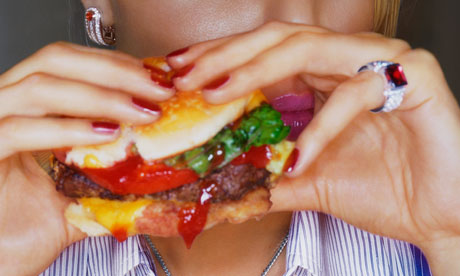
The government's controversial and voluntary public health "Responsibility Deal" has come under attack from the consumer group Which? for failing to make food and drink firms and supermarkets do more to encourage Britons to eat healthily.
In a report published today, Which? said many initiatives such as cutting salt and removing harmful trans fats were already under way before the scheme was launched, while newer ones such as the drive to increase vegetable and fruit consumption were too "vague" to be meaningful.
In an open letter to the public health minister, Anna Soubry, Which? executive director Richard Lloyd warned that the UK was facing "a public health crisis". He wrote: "Around one quarter of people are now obese and diet-related illnesses, such as cancers, heart disease and strokes, are the major killers. Which? research shows that nine out of 10 of us want to eat more healthily, but many people say they have difficulty putting this into practice."
The Responsibility Deal was set up by the Department of Health to promote action within the food industry to encourage people to eat more healthily. But the voluntary scheme, launched by the coalition government in March 2011, has attracted controversy for allowing fast-food firms, drinks makers and supermarket chains to help shape its approach to public health without being subjected to further legislation.
The latest research from Which? – published in a 55-page report A Taste for Change – has found that the responsibility deal's voluntary approach is not delivering on its promises; for example three of the top 10 supermarkets, serving millions of people (the Co-operative, Iceland and Lidl) have still not signed up to the calorie-reduction pledge. And it questions why there are no pledges whatsoever to tackle key areas such as saturated fat reduction and responsible marketing (including to children) and promotions.
Lloyd tells Soubry in the letter: "The pace of change among food companies must be dramatically increased and to drive this, the government should set out a much more ambitious approach. Which? urges you to incentivise companies to go further and faster by naming and shaming companies that underperform. Ultimately, you should be prepared to bring in legislation where voluntary action fails."
The warning comes amid striking evidence that "austerity Britain" is undergoing a nutritional recession, with rising food prices and shrinking incomes driving up consumption of fatty foods and reducing the amount of fruit and vegetables we buy.
Detailed data compiled for the Guardian by market research company Kantar Worldpanel, which analysed the buying habits of thousands of Britons, shows that consumption of fat, sugar and saturates has soared since 2010, particularly among the poorest households, despite the overall volume of food bought remaining almost static.
A spokesperson for the Department of Health replied by saying: "The Responsibility Deal is achieving real change and is helping consumers to make healthier choices. Under this scheme leading food and drink companies have committed to reduce calorie levels in their products, and major alcohol companies have pledged to remove a billion units of alcohol units from sale."
But the department acknowledged that while "the number of partners signed up to the scheme has more than doubled since the deal started ... we know that more needs to be done and we will continue to work closely with industry to achieve this."
A spokesperson for Co-operative Food said: "We have committed to signing up to the Calorie Pledge in the New Year, to complement the work we are already doing in this area, including initiatives in support of the Fruit and Veg Pledge. We recognise the importance of reducing calories in tackling obesity and are working to make it as easy as possible for our customers to adopt a healthy lifestyle.
"A minimum of 30% of foods on promotion are for healthy products, the nutritional content of our value products is at least as good as our standard equivalent lines and products in our Healthier Choice range are no more expensive than their standard equivalents."

